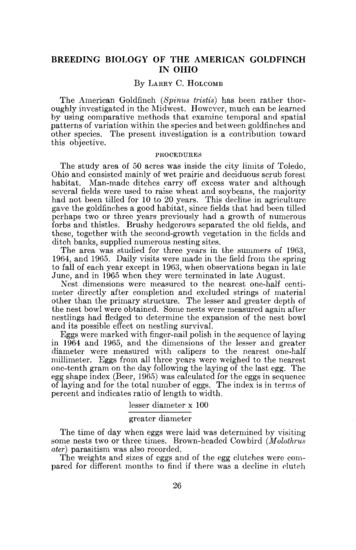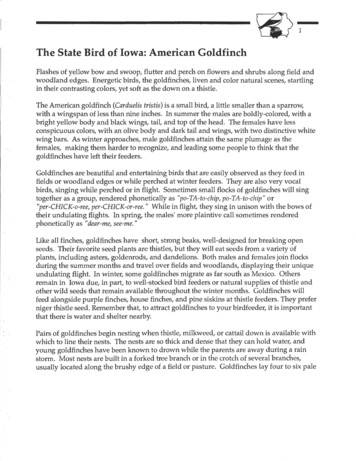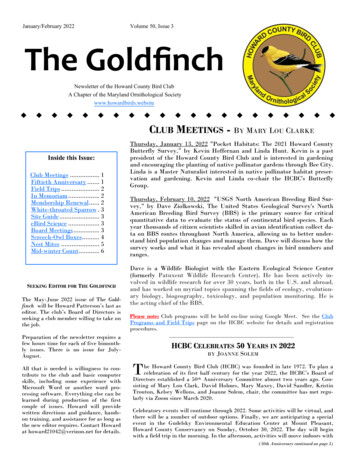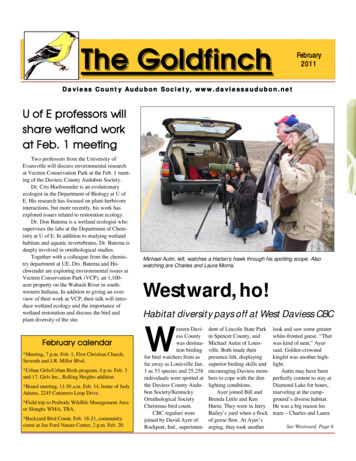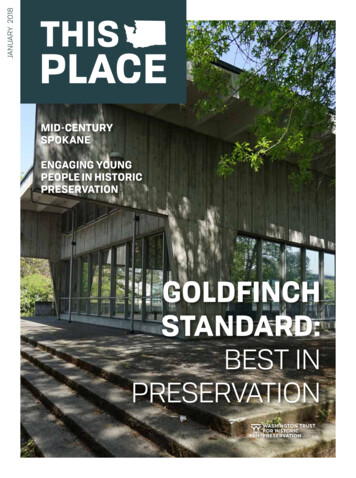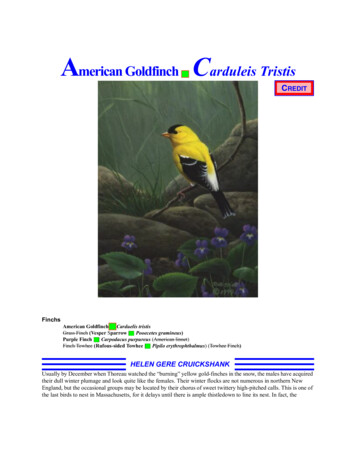
Transcription
American Goldfinch Carduleis TristisCREDITFinchsAmerican GoldfinchCarduelis tristisGrass Finch (Vesper SparrowPooecetes gramineus)Purple FinchCarpodacus purpureus (American linnet)Pipilo erythrophthalmus) (Towhee Finch)Finch Towhee (Rufous-sided TowheeHELEN GERE CRUICKSHANKUsually by December when Thoreau watched the “burning” yellow gold-finches in the snow, the males have acquiredtheir dull winter plumage and look quite like the females. Their winter flocks are not numerous in northern NewEngland, but the occasional groups may be located by their chorus of sweet twittery high-pitched calls. This is one ofthe last birds to nest in Massachusetts, for it delays until there is ample thistledown to line its nest. In fact, the
HDTTHOREAU’SWHAT?INDEXBIRDSassociation of this species with thistledown is so pronounced that Nuttall placed it in the sub-genus Carduelis (fromcarduus for thistle), to which the European goldfinch belongs. (See August 14, 1858.) The nest is formed so compactlythat it has been known to hold enough water to drown the young. The pale blue or white eggs number from four to six.Most young birds are fed some kind of animal food, and goldfinches might be expected to give their young soft insectsor worms. Instead, they feed them partially digested seeds by regurgitation. The undulatory flight of the goldfinch,accompanied by a cheerful per-chic-o-ree, is one of the familiar sights and sounds of New England summers.ALPHABETICALBIRDS
HDTWHAT?INDEXTHOREAU’SBIRDS1851July 27, Sunday: Henry Thoreau visited the famous Nyssa multiflora Tupelo tree at Cohasset that George B. Emersonhad famously gone 25 miles to see, that Isaac Sprague had illustrated in 1846 in A REPORT ON THE TREESAND SHRUBS GROWING NATURALLY IN THE FORESTS OF MASSACHUSETTS. PUBLISHEDAGREEABLY TO AN ORDER OF THE LEGISLATURE, BY THE COMMISSIONERS ON THE ZOOLOGICAL ANDBOTANICAL SURVEY OF THE STATE:EMERSON’S BOOK IN FULLJuly 27, Sunday: walked from Cohasset to Duxbury & sailed thence to Clark’s Island.Visited the large Tupelo Tree Nyssa multiflora in Scituate whose rounded & open top like some umbelliferousplants I could see from Mr Sewal’s1 –the tree which Geo Emerson went 25 miles to see– Called sometimesALPHABETICALBIRDS
HDTWHAT?INDEXTHOREAU’SBIRDSSnag tree & swamp Hornbeam also Pepperidge & Gumtree. Hard to split– We have it in Concord.2 Cardinalflower in bloom. Scit. meeting houses on very high ground –the principal one a landmark for sailors saw thebuckthorn which is naturalized. one of Marshfield meet. houses on the height of land on my road– The countrygenerally descends westerly toward the sources of Taunton river.–After taking the road by Webster’s beyond South Marshfield I walked a long way at noon hot & thirsty beforeI could find a suitable place to sit & eat my dinner –a place where the shade & the sward pleased me. At lengthI was obliged to put up with a small shade close to the ruts where the only stream I had seen for some timecrossed the road. Here also numerous robins [American RobinTurdus migratorius] came to cool & washthemselves & to drink. They stood in the water up to their bellies from time to time wetting their wings & tails& also ducking their heads & sprinkling the water over themselves –then they sat on a fence near by to dry. Then1. This Mr. Sewal of Scituate –be it remembered– was Edmund Quincy Sewall, Sr., the reverend daddy of the young lady to whomHenry Thoreau had in 1840 proposed, Miss Ellen Devereux Sewall.2. They did have it in Concord, and Thoreau visited this tree in Cohasset in 1851 — however, the specimen that is now preservedat the Harvard herbarium as Specimen #20 in Folder #4 happens to be one collected by Thoreau in New Bedford on June 17, 1857.ALPHABETICALBIRDS
HDTTHOREAU’SWHAT?INDEXBIRDSALPHABETICALBIRDS
HDTWHAT?INDEXTHOREAU’SBIRDSa goldfinch [American GoldfinchCarduleis tristis] came & did the same accompanied by the less brilliantfemale. These birds evidently enjoyed their bath greatly.– & it seemed indispensable to them.A neighbor of Websters told me that he had hard onto 1600 acres & was still buying more –a farm & factorywithin the year –cultivated 150 acres– I saw 12 acres of potatoes together –the same of rye & wheat & moremethinks of buck wheat. 15 or 16 men Irish mostly at 10 dollars a month doing the work of 50 with a yankeeoverseer long a resident of Marshfield named Wright. Would eat only the produce of his farm during the fewweeks he was at home –brown bread & butter –& milk –& sent out for a pig’s cheek to eat with his greens –ate only what grew on his farm but drank more than ran on his farmTook refuge from the rain at a Mr Stetsons in Duxbury –told me an anecdote which he heard Charles Emersontell of meeting Webster at a splendid house of ill fame in Washington where he (Emerson) had gone unwittinglyto call on a lady whose acquaintance he had formed in the stage. Mr Webster coming into the room unexpectedly–& patting him on the shoulder remarks “This is no place for young men like you”3I forgot to say that I passed the Winslow House now belonging to Webster– This land was granted to the familyin 1637.Sailed with tavern keeper Windsor who was going out mackreling. 7 men stripping up their clothes each3. The entirety of Charles Chauncy Emerson’s anecdote about Senator Daniel Webster at the Washington DC whorehouse wouldfor some undisclosed reason (certainly not to save the reputation of our nation’s capitol city, since it was during this period widelyrenowned for its many whorehouses) be silently elided by the editors of the 1906 edition of Thoreau’s journal.ALPHABETICALBIRDS
HDTWHAT?INDEXTHOREAU’SBIRDSCHARLES CHAUNCY EMERSONALPHABETICALBIRDS
HDTWHAT?INDEXTHOREAU’SBIRDSbearing an arm full of wood & one some new potatoes walked to the boats then shoved them out a dozen rodsover the mud –then rowed half a mile to the schooner of 43 tons. They expected be gone about a week & tobegin to fish perhaps the next morning –fresh mackerel which they carried to Boston. Had 4 dories & commonlyfished from them. Else they fished on the starboard side aft where their lines hung ready with the old baits on2 to a man I had the experience of going on a mackerel cruise.They went aboard their schooner in a leisurely way this Sunday evening with a fair but very slight wind–The sun now setting clear & shining on the vessel after several thunder showers. I was struck by the smallquantity of supplies which they appeared to take. We climbed aboard and there we were in a mackerel schooner–The baits were not dry on the hooks. Windsor cast overboard the foul juice of mackerels mixed with rain waterwhich remained in his trough. There was the mill in which to grind up the mackerel for bait –& the trough tohold it & the long handled dipper to cast it overboard with. and already in the harbor we saw the surface rippledwith schools of small mackerel. They proceeded leisurely to weigh anchor –& then to raise their two sails–There was one passenger going for health or amusement –who had been to California. I had the experience ofgoing a mackereling –though I was landed on an island before we got out of the harbor. They expected tocommence fishing the next morning. It had been a very warm day with frequent thunder showers– I had walkedfrom Cohasset to Duxbury –& had walked about the latter town to find a passage to Clarks Island about 3 milesdistant. But no boat could stir they said at that state of the tide.4 The tide was down & boats were left high &dry At length I was directed to Windsors tavern where perchance I might find some mackerel fishers who weregoing to sail that night to be ready for fishing in the morning –& as they would pass near the island they would4. Here Thoreau begins to tell the same story all over again in a different form, and the editors of the 1906 edition of the journalwould inform us that the reason for this repetition is clear to them — that this repetition indicated that Thoreau was preparing theaccount, to make use of it later in CAPE COD.ALPHABETICALBIRDS
HDTWHAT?INDEXTHOREAU’SBIRDStake me. I found it so Windsor himself was going– I told him he was the very man for me –but I must wait anhour– So I ate supper with them– Then one after another of his crew was seen straggling to the shore –for themost part in high boots –some made of India rubber –some with their pants stripped up –there were 7 for thisschooner beside a passenger & myself The leisurely manner in which they proceeded struck me. I had takenoff my shoes & stockings & prepared to wade. Each of the 7 took an armful of pine wood & walked with it tothe 2 boats which lay at high water mark in the mud –then they resolved that each should bring one more armful& that would be enough. They had already got a barrel of water and had some more in the schooner –also abucket of new potatoes. Then dividing into two parties we pulled & shoved the boats a dozen rods over the mud& water till they floated –then rowed half a mile or more over the shallow water to the little schooner & climbedaboard– many seals had their heads out– We gathered about the helmsman and talked about the compass whichwas affected by the iron in the vessel, &c &cClark’s Island Sunday nightOn Friday night Dec 8th o.s. the Pilgrims exploring in the shallop landed on Clark’s Island (so called from theMaster’s mate of the May Flower) where they spent 3 nights & kept their first sabbath. On Monday or the 11tho.s. they landed on the rock. This island contains about 86 acres and was once covered with red cedars whichwere sold at Boston for gate posts– I saw a few left –one 2 ft in diameter at the ground –which was probablystanding when the pilgrims came. Ed. Watson who could remember them nearly fifty years –had observed butlittle change in them. Hutchinson calls this one of the best islands in Mass. Bay. The Town kept it at first as asacred place –but finally sold it in 1690 to Sam. Lucas, Elkanah Watson, & Geo. Morton. Saw a Stag’s hornSumach 5 or 6 inches in diameter and 18 ft high– Here was the Marsh golden rod Solidago laevigata –not yetin blossom –a small bluish flower in the marshes which they called rosemary –a kind of Chenopodium whichappeared distinct from the common –and a short oval leaved set looking plant which I suppose is GlauxMaritima sea milkwort or Saltwort.Scates-eggs called in England Scate-barrows from their form on the sand. The old cedars were flat-toppedspreading the stratum of the wind drawn out–August 17, Sunday, 1851: On this day Bronson Alcott was reading Henry Thoreau’s poem “Lately, alas, I knew a gentleboy.”August 17, Sunday: For a day or two it has been quite cool –a coolness that was felt even when sittingby an open window in a thin coat on the west side of the house in the morning –& you naturally sought the sunat that hour– The coolness concentrated your thought however– As I could not command a sunny windowI went abroad on the morning of the 15th and lay in the sun in the fields in my thin coat though it was rathercool even there. I feel as if this coolness would do me good. If it only makes my life more pensive why shouldpensiveness be akin to sadness. There is a certain fertile sadness which I would not avoid but rather earnestlyseek– It is positively joyful to me– It saves my life from being trivial. My life flows with a deeper current –no longer as a shallow & brawling stream parched & shrunken by the summer heats– This coolness comesto condense the dews & clear the atmosphere. The stillness seems more deep & significant –each sound seemsto come from out a greater thoughtfulness in nature –as if nature had acquired some character & mind –thecricket –the gurgling –stream –the rushing wind amid the trees –all speak to me soberly yet encouraginglyof the steady onward progress of the universe– My heart leaps into my mouth at the sound of the wind inthe woods–5 I whose life was but yesterday so desultory & shallow –suddenly recover my spirits –my spirituality through my hearing– I see a goldfinch [American GoldfinchCarduleis tristis] gotwittering through the still louring day and am reminded of the peeping flocks which will soon herald thethoughtful season– Ah! if I could so live that there should be no desultory moment in all my life! That in thetrivial season when small fruits are ripe my fruits might be ripe also that I could watch nature always with myALPHABETICALBIRDS
HDTWHAT?INDEXTHOREAU’SBIRDSmoods! That in each season when some part of nature especially flourishes –then a corresponding part of memay not fail to flourish Ah, I would walk I would sit & sleep with natural piety– What if I could pray aloud orto myself as I went along by the brooksides a cheerful prayer like the birds! For joy I could embrace the earth–I shall delight to be buried in it. And then to think of those I love among men –who will know that I love themthough I tell them not. I sometimes feels as if I were rewarded merely for expecting better hours–I did not despair of worthier moods –and now I have occasion to be grateful for the flood of life that is flowingover me. I am not so poor– I can smell the ripening apples –the very rills are deep –the autumnal flowersthe trichostema dichotoma –not only its bright blue flower above the sand but its strong wormwood scentwhich belongs to the season feed my spirit –endear the earth to me –make me value myself & rejoice–The quivering of pigeons’ [American Passenger PigeonsEctopistes migratorius] wings –reminds me ofthe tough fibre of the air which they rend. I thank you God. I do not deseve [deserve] anything I am unworthyof the least regard & yet I am made to rejoice. I am impure & worthless –& yet the world is gilded for my delight& holidays are prepared for me –& my path is strewn with flowers But I cannot thank the Giver– I cannot evenwhisper my thanks to those human friends I have. It seems to me that I am more rewarded for my expectationsthan for anything I do or can do. Ah I would not tread on a cricket in whose song is such a revelation –so soothing & cheering to my ear. O keep my senses pure! And why should I speak to myfriends? for how rarely is it that I am I –and are they, then, they? We will meet then far away. The seeds ofthe summer are getting dry & falling from a thousand nodding heads. If I did not know you through thick & thinhow should I know you at all? Ah the very brooks seem fuller of reflections than they were –ah such provokingsybilline sentences they are – – the shallowest is all at once unfathomable– how can that depth be fathomedwhen a man may see himself reflected– The rill I stopped to drink at I drink in more than I expected– I satisfy–& still provoke the thirst of thirsts– Nut Meadow brook where it crosses the road beyond Jenny Dugans thatwas. I do not drink in vain I mark that brook as if I had swallowed a water snake –that would live in mystomack– I have swallowed something worth the while– The days is not what it was before I stooped to drink.Ah I shall hear from that draught –it is not in vain that I have drunk.– I have drank an arrow-head. It flows fromwhere all fountains rise.PRAYER5. William M. White’s version is:This coolness comes to condense the dews and clear the atmosphere.The stillness seems more deep and significant.Each sound seems to comeFrom out a greater thoughtfulness in nature, as if nature had acquired somecharacter and mind.The cricket,The gurgling stream,The rushing wind amid the trees,All speak to me soberly yet encouraginglyOf the steady onward progress of the universe.My heart leaps into my mouthAt the sound of the wind in the woods.ALPHABETICALBIRDS
HDTWHAT?INDEXTHOREAU’SBIRDSHow many ova have I swallowed –who knows what will be hatched within me? There were some seeds ofthought methinks floating in that water which are expanding in me– The man must not drink of the runningstreams the living waters –who is not prepared to have all nature reborn in him –to suckle monsters– The snakein my stomack lifts his head to my mouth at the sound of running water. When was it that I swallowed a snake.I have got rid of the snake in my stomack. I drank at stagnant waters once. That accounts for it. I caught him bythe throat & drew him out & had a well day after all. Is there not such a thing as getting rid of the snake whichyou swallowed when young? When thoughtless you stooped & drank at stagnant waters –which has worriedyou in your waking hours & in your sleep ever since & appropriated the life that was yours. Will he not ascendinto your mouth at the sound of running water– Then catch him boldly by the head & draw him out though youmay think his tail be curled about your vitals.The farmers are just finishing their meadow haying (today is sunday)– Those who have early potatoes may bedigging them or doing any other job which the haying has obliged them to postpone– For six weeks or morethis has been the farmer’s work to shave the surface of the fields & meadows clean. This is done all over thecountry –the razor is passed over these parts of nature’s face the country over– A 13th labor which methinkswould have broken the backs of Hercules would have given him a memorable sweat –accomplished with whatsweating of scythes & early & late– I chance know one young man who has lost his life in this seasonscampaingn by over doing– In haying time some men take double wages & they are engaged long before in thespring. To shave all the fields & meadows of New England clean– If men did this but once & not every year –we should never hear the last of that labor –it would be more famous in each farmers case than Buonaparte’sALPHABETICALBIRDS
HDTWHAT?INDEXTHOREAU’SBIRDSroad over the Simplon. It has no other bulletin but the truthful farmer’s almanac– Ask them where scythesnathes are made & sold & rifles too if it is not a real labor. In its very weapons & its passes it has the semblanceof war. Mexico was won with less exertion & less true valor than are required to do one season’s haying in NewEngland– The former work was done by those who played truant and ran away from the latter.Those Mexican’s were mown down more easily than the summer’s crop of grass in many a farmer’s fields.Is there not some work in New England men. This haying is no work for marines nor for deserters –nor for US troops so called nor for Westpoint cadets –it would wilt them & they would desert. Have they not deserted?–every field is a battle field to the mower –a pitched battle too –and whole winrows of dead have covered it inthe course of the season. Early & late the farmer has gone forth with his formidable scythe –weapon of time –Times weapon –& fought the ground inch by inch– It is the summer’s enterprise. And if we were a more poeticpeople horns would be blowed to celebrate its completion –there might be a hay maker’s day– New Englandspeaceful battles– At Bunker Hill there were some who stood at the rail fence & behind the winrows of newmown hay– They have not yet quitted the field. They stand there still –they have not retreated.The polygala sanguinea caducous polygala in damp ground with red or purple heads–The dandelion still blossoms & the lupine still belated. I have been to Tarbels swamp by the 2nd division thisafternoon & to the Marlboro road It has promised rain all day –cloudy & still & rather cool –from time to timea few drops gently spitting but no shower The landscape wears a sober autumnal look– I hear a drop or two onmy hat– I wear a thick coat– The birds seem to know that it will not rain just yet. The swallowsskim lowover the pastures twittering as they fly near me with forked tail dashing near me as if I scared up insects forthem. I see where a squirrel has been eating hazel nuts on a stump.Tarbel’s swamp is mainly composed of low & even but dense beds of Andromeda caliculata or dwarfAndromeda which bears the early flower in the spring– Here & there mingled with it is the Andromedapolifolia or Water Andromeda? Also pitch pines birches –hardhack & the common alder Alnus serrulata –and in separate & lower beds the cranberry –& probably the Rhodora Canadensis might be found.The lead colored berries of the viburnum dentatum now– Cow Wheat & indigo weed still in bloom by the drywoodpath side. & Norway cinquefoil. I detected a wild apple on the Marlboro road by its fragrance –in the thick woods –small stems 4 inches in diameter falling over or leaning like rays on every side –a clean white fruit –the ripest yellowish –a pleasant acid –the fruit covered the ground. It is unusual to meet withan early apple thus wild in the thickest woods. It seemed admirable to me. One of the noblest of fruits.With green specks under the skinPrenanthes Alba white flowering P. with its strange halbert & variously shaped leaves.ALPHABETICALBIRDS
HDTWHAT?INDEXTHOREAU’SBIRDSNeottia& HypericumI hear the rain (11 PM) distilling upon the ground –wetting the grass & leaves– The melons needed it–Their leaves were curled & their fruit stinted.I am less somnolent for the cool season. I wake to a perennial day. The hayer’s work is done, but I hear noboasting –no firing of guns nor ringing of bells. He celebrates it by going about the work he hadpostponed. “till after haying.” If all this steadiness & valor were spent upon some still worthier enterprise!!All men’s employments –all trades & professions in some of their aspects are attractive– Hence the boyresolved to be a minister & make cider –not thinking boy as he was how little fun there was in being a minister–willing to purchase that pleasure at any price– When I saw the carpenters the other day repairing Hubbardsbridge their bench on the new platform they had laid over the water in the sun & air with no railing yetto obstruct the view I was almost ready to resolve that I would be a carpenter & work on bridges– To securea pleasant place to work– One of the men had a fish line cast round a sleeper which he looked at from timeto time.–John Potter told me that those root fences on the Corner road were at least 60 or 70 yrs old.– I see a solitaryGoldfinch [American GoldfinchCarduleis tristis] now & then.Hieracium Marianum or scabrum }Marlboro road.“Kalmii or Canadense }Leontodon Autumnale passimAugust 19, Tuesday: Captain Gennadi Nevelskoy discovered that the Amur River flowed directly into thePacific Ocean. He raised the Russian flag on Sakhalin Island, directly across from the river’s mouth, thusclaiming the island for Russia. For these efforts he would be demoted for acting without orders; however, theRussian government would retain this island.CUVIERAugust 19, Tuesday: Clematis Virginiana –Calamint –Lycopus Europeus water horehound This is aworld where there are flowers. Now at 5 AM the fog which in the west looks like a wreath of hard rolled cottonbatting –is rapidly dispersing. The echo of the railroad whistle is heard the horizon round –the gravel train isstarting out. The farmers are cradling oats in some places. For some days past I have noticed a red maple or twoabout the pond though we have had no frost. The grass is very wet with dew this morning.The way in which men cling to old institutions after the life has departed out of them & out of themselvesreminds me of those monkies which cling by their tails –aye whose tails contract about the limbs –even the deadlimbs of the forest and they hang suspended beyond the hunters reach long after they are dead It is of no use toargue with such men They have not an apprehensive intellect but merely as it were a prehensile tail. Theirintellect possesses merely the quality of a prehensile tail. The tail itself contracts around the dead limb evenafter they themselves are dead –and not till corruption takes place do they fall.The black howling monkey, or Caraya –according to Azara it is extremely dif. to get at them for “When mortallywounded they coil the tail round a branch, and hang by it with the head downwards for days after death,and until, in fact, decomposition begins to take effect.”– The commenting Naturalist says “a singularpeculiarity of this organ is to contract at its extremity of its own accord as soon as it is extended to its fulllength.” I relinquish argument, I wait for decomposition to take place, for the subject is dead. as I value the hidefor museums. They say “though you’ve got my soul, you shan’t have my carcass.”PM to Marlboro Road via Clamshell Hill –Jenny Dugan’s –Round Pond Canoe Birch road (Dea Dakins)& White Pond.–ALPHABETICALBIRDS
HDTWHAT?INDEXTHOREAU’SBIRDSHow many things concur to keep a man at home, to prevent his yielding to his inclination to wander. If I wouldextend my walk a hundred miles I must carry a tent on my back for shelter at night or in the rain, or at leastI must carry a thick coat to be prepared for a change in the weather. So that it requires some resolution as wellas energy and foresight to undertake the simplest journey. Man does not travel as easily as the birds migrate–He is not everywhere at home like flies. When I think how many things I can conveniently carry, I am wont tothink it most convenient to stay at home. My home then to a certain extent is the place where I keep my thickcoat & my tent & some books which I can not carry. Where next I can depend upon meeting some friends–And where finally I even I have established myself in business– But this last in my case is the least importantqualification of a home.The poet must be continually watching the moods of his mind as the astronomer watches the aspects of theheavens. What might we not expect from a long life faithfully spent in this wise –the humblest observer wouldsee some stars shoot.– A faithful description as by a disinterested person of the thoughts which visited a certainmind in 3 score years & 10 as when one reports the number & character of the vehicles which pass a particularpoint. As travellers go round the world and report natural objects & phenomena –so faithfully let another stayat home & report the phenomena of his own life. Catalogue stars –those thoughts whose orbits are as rarelycalculated as comets It matters not whether they visit my mind or yours –whether the meteor falls in my fieldor in yours –only that it came from heaven. (I am not concerned to express that kind of truth which nature hasexpressed. Who knows but I may suggest some things to her. Time was when she was indebted to suchsuggestions from another quarter –as her present advancement shows. I deal with the truths that recommendthemselves to me please me –not those merely which any system has voted to accept.) A meteorological journalof the mind– You shall observe what occurs in your latitude, I in mine.Some institutions –most institutions, indeed, have had a divine origin. But of most that we see prevailing insociety nothing but the form, the shell, is left –the life is extinct –and there is nothing divine in them. Then thereformer arises inspired to reinstitute life –& what ever he does or causes to be done is a reestablishment of thatsame or a similar divineness. But some who never knew the significance of these instincts –are by a sort of falseinstinct found clinging to the shells. Those who have no knowledge of the divine appoint themselves defendersof the divine –as champions of the church &c I have been astonished to observe how long some audiences canendure to hear a man speak on a subject which he knows nothing about –as religion for instance –when one whohas no ear for music might with the same propriety take up the time of a musical assembly with putting throughhis opinions on music. This young man who is the main pillar of some divine institution –does he know whathe has undertaken. If the saints were to come again on earth would they be likely to stay at his house –wouldthey meet with his approbation even? Ne sutor ultra crepidam. They who merely have a talent for affairs –areforward to express their opinions–ALPHABETICALBIRDS
HDTWHAT?INDEXTHOREAU’SBIRDSA Roman soldier sits there to decide upon the righteousness of Christ– The world does not long endure suchblunders –though they are made every day. The weak-brained & pusilanimous farmers would fain abide by thethe institutions of their fathers. their argument is they have not long to live, and for that little space let them notbe disturbed in their slumbers –blessed are the peace makers –let this cup pass from me &cHow vain it is to sit down to write when you have not stood up to live! Methinks that the moment my legs beginto move my thoughts begin to flow –as if I had given vent to the stream at the lower end & consequently newfountains flowed into it at the upper. A thousand rills which have their rise in the sources of thought –burst forth& fertilise my brain. you need to increase the draught below –as the owners of meadows on C. river say of theBillerica Dam. Only while we are in action is the circulation perfect. The writing which consists with habitualsitting is mechanical wooden dull to read.The grass in the high pastures is almost as dry as hay– The seasons do not cease a moment to revolve andtherefore nature rests no longer at her culminating point than at any other. If you are not out at the right instantthe summer may go by & you not see it. How much of the year is spring & fall –how little can be called summer!The grass is no sooner grown than it begins to wither– How much nature herself suffers from drought! It seemsquite as much as she can do to produce these cropsThe most inattentive walker can see how the science of geology took its rise. The inland hills & promontoriesbetray the action of water on their rounded sides as plainly as if the work were completed yesterday. He sees itwith but half an eye as he walks & forgets his thought again. Also the level plains & more recent meadows &marine shells found on the tops of hills– The Geologist painfully & elaborately follows out these suggestions–& hence his fine spun theories.The gold finch [American GoldfinchCarduleis tristis] –though solitary is now one of the com
American Goldfinch Carduleis Tristis Finchs American Goldfinch Carduelis tristis Grass Finch (Vesper Sparrow Pooecetes gramineus) Purple Finch Carpodacus purpureus (American linnet) Finch Towhee (Rufous-sided Towhee Pipilo erythrophthalmus) (Towhee Finch) HELEN GERE CRUICKSHANK Usually by D



